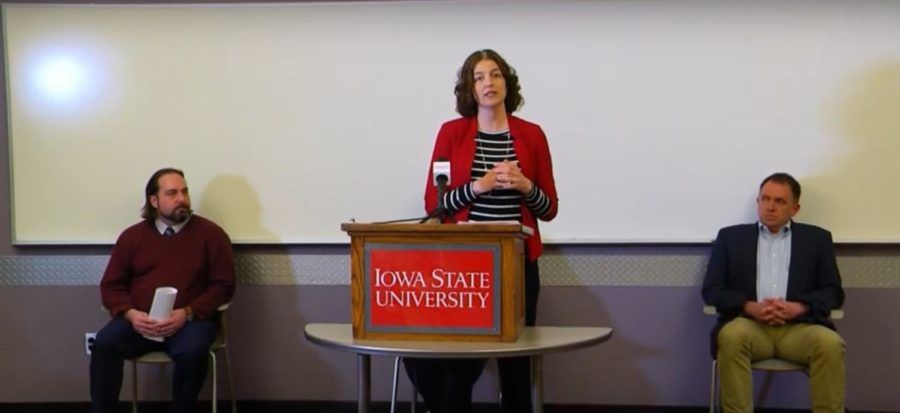University officials address suspension of spring break study abroad and COVID-19 concerns
Iowa State University officials addressed questions about their decisions for study abroad programs. Spring break study abroad programs have been suspended because of the COVID-19 threats.
March 4, 2020
Iowa State suspended spring break study abroad programs Wednesday for Africa, Asia and Europe because of the COVID-19 threats.
The decision to suspend spring break study abroad programs followed the decision Saturday to require students studying abroad in Italy to return to the United States by Friday.
University officials responded to questions at a forum Wednesday about the decisions the university has made about travel because of the COVID-19 outbreak.
University officials addressed the academic credit status of students, safety measures and the financial impact to students.
Frank Peters, director of Study Abroad Center, said Italy is one of the university’s largest study abroad destinations.
The College of Design has a facility in Rome, and Peters said students attending the facility will be accommodated academically after spring break. The university is working on academic continuation plans for the other students.
“[The plans] vary because our students went to a variety of schools,” Peters said. “So some of those schools are offering an online option, and then we are working aggressively right now to provide other options for those students whose courses may not be offered online.”
Erin Baldwin, assistant vice president for Student Affairs and director of Thielen Student Health Center, said they are encouraging the students returning to the U.S. from their study abroad location to self-quarantine for the first 14 days after their return.
“So with self-isolation, we do encourage them to go home,” Baldwin said. “We do have some spaces on campus that are outside of our regular residential facilities where we can safely self-isolate them.”
Returning students are also supposed to take their temperature every day and report any noticed symptoms.
A question from the audience was about the financial impact this will have on the university with reimbursing each student studying abroad, which is up to $1,200 for flight cost.
“At this time, we have not calculated [the cost],” Peters said. “There’s other priorities we’re working on. Safety is number one. Academic continuity is number two.”
Peters said the spring break money is not currently a priority, but they are working with their partners to see what can be refunded.
In regards to future study abroad programs, Shaun Jamieson, international risk analyst for the Office of Risk Management, said they are constantly considering all programs for COVID-19 associated risks and other risks.
“That’s part of why a position like mine exists at the university, is to continue to monitor global events,” Jamieson said. “So I am tracking that, and I’m giving regular updates to study abroad and to our leadership team.”
Angela Hunt, interim director of media relations in the Office of Strategic Relations and Communications, said as of 4 p.m. Wednesday, out of the 135 total students studying abroad in Italy, 108 students have reported travel itineraries and 92 of the 108 have arrived or are arriving in the U.S.
All six students who were studying abroad in South Korea are back in the U.S. Hunt said they are providing housing separate from the general population for three students.
There will be a video of Wednesday’s discussion available on the safety page as soon as possible. The full video of the forum can be found on Iowa State’s News Service YouTube account.

















